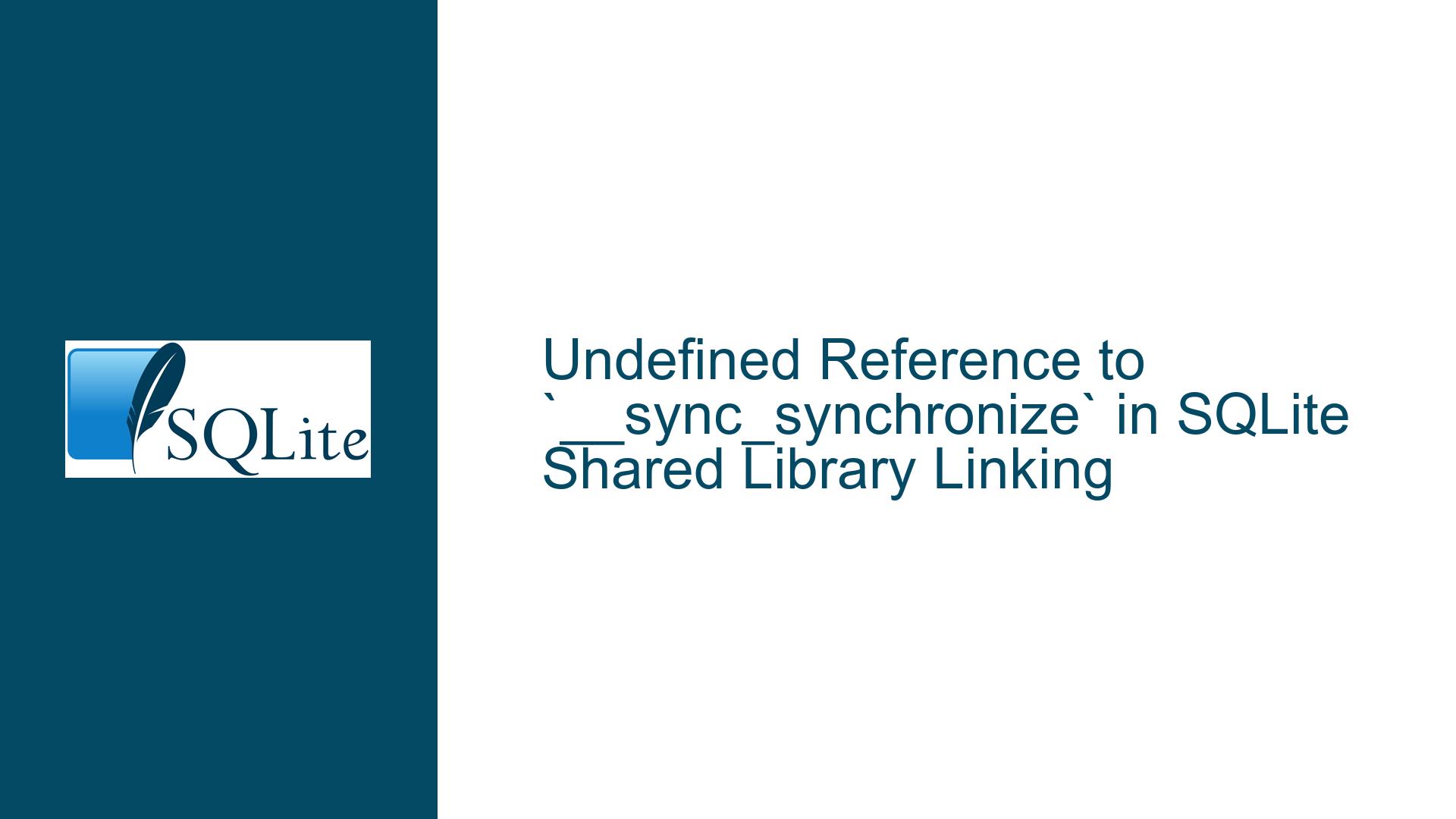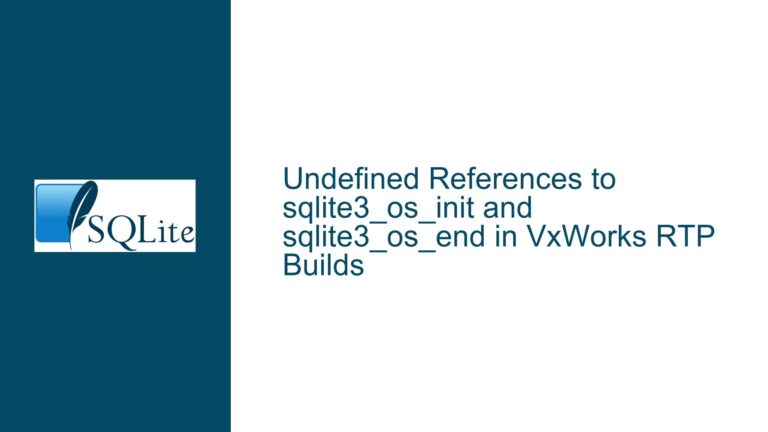Undefined Reference to `__sync_synchronize` in SQLite Shared Library Linking
Compilation and Linking Errors with __sync_synchronize in SQLite
When compiling SQLite and linking it as a shared library (libsqlite-3.31.1.so) with an application, a common issue arises when the linker reports an undefined reference to __sync_synchronize. This error typically occurs when the SQLite source code attempts to use a GCC-specific intrinsic for memory barrier operations, but the compiler or toolchain being used does not support this intrinsic. In this case, the Intel C Compiler (ICC) version 10.1 is being used, which lacks support for __sync_synchronize. This issue is further complicated by the mixing of compilers or the use of outdated compiler versions that do not align with the requirements of the SQLite source code.
The __sync_synchronize intrinsic is a GCC-builtin function that ensures a full memory barrier, preventing the reordering of memory operations across the barrier. SQLite uses this intrinsic to enforce memory consistency in multi-threaded environments. When the compiler does not recognize this intrinsic, the linker fails to resolve the reference, resulting in the error. This problem is particularly prevalent when using older versions of the Intel C Compiler or when the build environment is not configured to use a consistent compiler toolchain.
Intel C Compiler (ICC) Version Mismatch and Missing Intrinsics
The root cause of the undefined reference to __sync_synchronize error lies in the mismatch between the compiler version and the requirements of the SQLite source code. The Intel C Compiler (ICC) version 10.1, which is being used in this scenario, does not support the __sync_synchronize intrinsic. This intrinsic was introduced in later versions of ICC (starting from version 11) and is natively supported by GCC. SQLite’s source code checks for the presence of the __GNUC__ preprocessor symbol to determine whether the compiler supports this intrinsic. When __GNUC__ is defined, SQLite assumes that __sync_synchronize is available, leading to the linker error when it is not.
Additionally, the build process involves multiple steps, including compiling the SQLite source code (sqlite3.c) into an object file (sqlite3.o) and then linking this object file into a shared library (libsqlite-3.31.1.so). If the compiler used for these steps is inconsistent or lacks the necessary features, the linking process will fail. In this case, the use of ICC 10.1 for both compilation and linking does not resolve the issue because the intrinsic is missing entirely.
Another contributing factor is the potential mixing of compiler toolchains. Even if the same compiler (ICC) is used for both steps, the presence of GCC-specific flags or dependencies in the build environment can lead to conflicts. For example, the use of -cxxlib-gcc in the compilation flags indicates that the GCC standard library is being linked, which may introduce additional dependencies or assumptions about the availability of GCC-specific features.
Defining SQLITE_MEMORY_BARRIER and Ensuring Compiler Compatibility
To resolve the undefined reference to __sync_synchronize error, the most effective solution is to define the SQLITE_MEMORY_BARRIER preprocessor symbol. This symbol allows SQLite to use an alternative memory barrier implementation when the __sync_synchronize intrinsic is not available. By defining SQLITE_MEMORY_BARRIER as asm volatile("mfence":::"memory"), SQLite will use the mfence assembly instruction to enforce a memory barrier, bypassing the need for the GCC intrinsic.
The steps to implement this solution are as follows:
Modify the Compilation Flags: Add the
-DSQLITE_MEMORY_BARRIER="asm volatile(\"mfence\":::\"memory\")"flag to the compilation command forsqlite3.c. This ensures that the SQLite source code uses themfenceinstruction instead of__sync_synchronize.Recompile the SQLite Source Code: Recompile
sqlite3.cwith the modified flags to generate a new object file (sqlite3.o). This object file will now include the alternative memory barrier implementation.Link the Shared Library: Use the updated object file to create the shared library (
libsqlite-3.31.1.so). The linker should no longer report an undefined reference to__sync_synchronize.Verify Compiler Compatibility: Ensure that the same compiler (ICC) is used consistently throughout the build process. Avoid mixing compiler toolchains or using incompatible flags that may introduce additional dependencies.
Update the Compiler Version: If possible, upgrade to a newer version of the Intel C Compiler (ICC 11 or later) that supports the
__sync_synchronizeintrinsic. This will eliminate the need for the workaround and ensure compatibility with future versions of SQLite.
By following these steps, the undefined reference to __sync_synchronize error can be resolved, allowing the SQLite shared library to be successfully linked with the application. This solution not only addresses the immediate issue but also ensures that the build process is robust and consistent, reducing the likelihood of similar errors in the future.
Detailed Explanation of Memory Barriers and Compiler Intrinsics
Memory barriers are critical in multi-threaded programming to ensure that memory operations are executed in the correct order. Without memory barriers, the compiler or processor may reorder instructions, leading to unpredictable behavior in concurrent environments. The __sync_synchronize intrinsic is a GCC-builtin function that inserts a full memory barrier, preventing the reordering of memory operations across the barrier. This is particularly important in SQLite, which relies on memory barriers to maintain data consistency in multi-threaded scenarios.
The mfence assembly instruction, used as an alternative to __sync_synchronize, performs a similar function by enforcing a memory fence. This instruction ensures that all memory operations before the fence are completed before any operations after the fence are executed. By defining SQLITE_MEMORY_BARRIER as asm volatile("mfence":::"memory"), SQLite can achieve the same level of memory consistency without relying on the GCC intrinsic.
Impact of Compiler Version and Toolchain Consistency
The choice of compiler and toolchain has a significant impact on the build process and the resulting binary. In this case, the use of an outdated version of the Intel C Compiler (ICC 10.1) is the primary cause of the undefined reference to __sync_synchronize error. Upgrading to a newer version of ICC or switching to a compatible compiler (such as GCC) can resolve this issue and provide additional benefits, including improved performance and support for modern language features.
Consistency in the build environment is also crucial. Mixing compilers or using incompatible flags can introduce subtle errors and dependencies that are difficult to diagnose. By ensuring that the same compiler and toolchain are used throughout the build process, developers can avoid these issues and create more reliable and maintainable software.
Conclusion
The undefined reference to __sync_synchronize error is a common issue when compiling SQLite with older or incompatible compilers. By defining the SQLITE_MEMORY_BARRIER preprocessor symbol and ensuring compiler compatibility, this error can be resolved, allowing the SQLite shared library to be successfully linked with the application. This solution not only addresses the immediate issue but also highlights the importance of using consistent and up-to-date toolchains in the build process. By following these best practices, developers can avoid similar errors and create robust, high-performance applications that leverage the full capabilities of SQLite.






